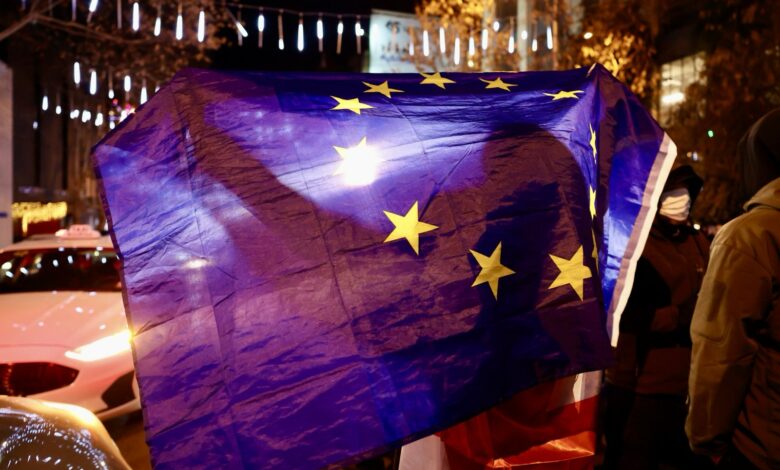
Brussels: Georgia’s FARA “Serious Setback” for Democracy
The enactment of the Foreign Agents Registration Act (FARA) in Georgia on May 31 drew sharp criticism from European leaders, who said the step marks a serious setback for democracy and further distances the country from its EU path. Though translated from the original U.S. law, GD’s FARA is widely believed to be enforced arbitrarily to crack down on civil society, independent media, and dissent.
EU’s High Representative/Vice-President Kaja Kallas and Commissioner Marta Kos said in their joint statement that FARA marks a “serious setback” for Georgia’s democracy.
“Alongside recent laws on broadcasting and grants, it represents another aggressive action by the Georgian authorities to suppress dissent, restrict freedoms, and further shrink the space for activists, civil society, and independent media,” Kallas and Kos write. “These repressive measures threaten the very survival of Georgia’s democratic foundations and the future of its citizens in a free and open society.”
Noting the European Council’s conclusions of June and October of 2024, which stressed that the ruling government’s actions “jeopardized Georgia’s EU path,” and that the EU accession process has been de facto halted, Kallas and Kos reitererated the bloc’s call on the GD authorities “to heed their citizens clear demands for democracy and a European future, and to release all unjustly detained journalists, activists, protesters, and political leaders.”
The statement concludes, “The EU is ready to consider the return of Georgia to the EU accession path if the authorities take credible steps to reverse democratic backsliding,” putting the responsibility solely on the GD authorities.
The Swedish Ministry of Foreign Affairs said that FARA “adds to the recent string of repressive legislation seeking to suppress independent voices in Georgia.” The ministry expressed Sweden’s support for Georgia’s civil society and its work for human rights and democracy in the country.
The Norwegian MFA shared the EU’s position, adding, “Repressive measures threaten the survival of Georgia’s democratic foundations and its citizens’ future in a free and open society.”
The law marks “another grim step in Georgian Dream’s crackdown on democracy in Georgia,” said Estonian Foreign Minister Margus Tsahkna. “The law violates core democratic principles, silences critics, civil society, media, and clearly derails Georgia from its path toward the EU,” he added.
The GD government “has taken another big step to quash hopes and aspirations of its people for a European future,” wrote Latvia’s Minister of Foreign Affairs, Baiba Braže, on social media.
Georgia’s fifth president, Salome Zurabishvili, said in response to Commissioner Marta Kos that calling on the GD authorities, who, she said, are responsible for “stopping the European path and imposing Russian laws,” is “hopeless.”
“But EU”s active support is needed for the massively pro-European citizens of Georgia and their demand for New elections in line with the European Parliament Resolution,” Zurabishvili wrote on X.
Also Read:
- 16/04/2025 – GD Rubber Stamps Legislation Forcing Donors to Seek Its Approval for Grant Awards
- 01/04/2025 – GD Rubber Stamps FARA, Broadcasting Law Changes, Revives Treason, Removes Gender, Excludes CSOs
This post is also available in: ქართული
